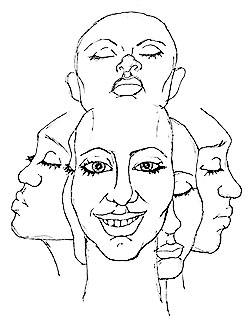‘We Want to Be Heard, Not Fixed’
Child welfare needs to focus on supporting people, not fixing problems.
| |
 |
| illustration by Michael Blamo |
When we grow up in care, we’re mandated to services. When we come back into the system as parents, it still feels like no one’s listening to what we think we need. Here, five foster care alum and parents—whose names have been changed because they have open cases—explain the approaches that have worked for them.
1. To support parents, listen to what we say we need.
Sienna: When you’re involved in the system, as a child or a parent, it seems like people are so ready to diagnosis you. They say you’re mentally unstable, even though sometimes you’re just in a lot of pain. When the system and the courts slap you with a diagnosis without even understanding the situation you’re in or listening to what you think you need, you feel stereotyped and discriminated against.
Mitchell: For a number of years after I left foster care, I struggled with my emotions. Finally I found a program called The Bridge New York. The Bridge offers lots of different services but they don’t tell you what services you need. They ask you how you want to move forward with your life. If you say you need support with housing or employment, they have that. If you say you need therapy, they have that too.
2. We want to feel good about our lives and families.
Mitchell: The Bridge also has a strong art program, and that is one of the things that kept me going there. Art has always been an important part of my life. When I started going to The Bridge, I’d been told that I wasn’t good enough to get into any school, but doing art at The Bridge allowed me to feel really successful. I’ve been going there for eight years and we even have shows at the Museum of Modern Art. Art also helps me get out the pain even when I don’t want to talk. Art erases all the drama in my head.
Andrea: When I was younger and running the streets, I joined a group called GEMS, which taught me how to be an advocate and change conditions for sexually trafficked youth. More recently, I’ve been writing for Rise and making presentations to staff about what the system feels like to parents. It feels great to have a voice in improving other people’s lives. Advocating for others also helps me get clear about how to advocate for my own family. Now when I go into meetings at my agency or with ACS, I’m able to think more logically and ask for what my family needs.
Sienna: With my youngest child, I’ve gotten support from a home-visiting program called Healthy Families New York. It gave me information before my baby was born and continued connecting me to resources afterward.
The woman who visits me is a mandated reporter. Still, I don’t feel like she’s there to report me. She doesn’t ask: ‘What did you do wrong?’ When I’m struggling, she says, “That could happen to anyone.” She’s also done nice things for me, like thrown me a baby shower. I didn’t have that with my other children.
3. Help us build community.
Tiffany: When I was growing up, I was used to not being understood. So when I started having problems with my daughter’s father, I was just stuck in my own miserable self. I never would have gone to a support group if the court didn’t mandate me.
But the parent support group I go to at the Lower East Side Family Union has been good for me.
We do meditation, and they encourage us to find time in our week just for ourselves. We have fun too, like when we role play what it’s like being a mother in different situations. More than anything, just hearing other women’s experiences has helped.
Sienna: When we come back into the system as parents, it seems like there’s nothing just for parents. I’ve had caseworkers tell me, “I’m not here for you. I’m here for your children.” Some agencies have parent advocates, but lots of times you only see them at conferences. If agencies had groups just for parents, it would feel a lot more like the system was willing to support us.
4. Offer information and choices.
Wendy: When we come out of foster care, a lot of us don’t have family support, and we don’t know about any services. Besides, we’re stubborn and we’re used to doing everything and learning everything on our own.
But it would help if the system gave us more information so that parents—especially those leaving foster care—knew more about the good things out there. If there were billboards in our neighborhoods and commercials on TV, we could feel like we had choices. It would be great, too, if we could hear from other parents about which services made them feel safe and which made them feel like they were going to get reported just for walking through the door.
(back to top)

